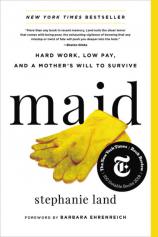Reading Group Guide
Discussion Questions
Maid: Hard Work, Low Pay, and a Mother's Will to Survive

1. What were your opinions about poverty and the poor before you read MAID? What were the sources of the information that influenced these opinions?
2. What is class prejudice? What ideas make up the “wall of stigmas” that Land is faced with? What explains the psychology of antagonism toward the poor?
3. Why had each of Land’s parents “moved on”? What explains the emotional abandonment of their daughter and granddaughter? How did this lack of support affect Land?
4. In what ways does cleaning people’s houses seem like “a last resort” to Land? What are the effects of feeling “invisible” at a job?
5. What are the particular challenges for Mia? What’s most important for children affected by poverty?
6. What state and federal programs are helpful to Hand and Mia? What are the challenges of accepting such assistance?
7. What explains Travis’ “lack of desire to wander, or wonder, or learn”? What else might prevent people from wanting to understand themselves and the world more?
8. When plagued by deep grief or other emotional pain, Land gave it her attention because “the pain didn’t like to be ignored. It needed to be loved.” What does this mean? What are other healthy responses to grief or loss?
9. Moving into the small studio apartment, Land struggles to get rid of things “equally useless and priceless.” What is the power or importance of material things? In what ways is a family’s history carried in things or not?
10. After beting overwhelmed while cleaning The Clown House, Land calls Pam, who, after listening, reminds her to “trust your strength.” What are Land’s particular strengths? How does she stay hopeful and motivated?
11. Consider the various different houses Land cleans: The Porn House, Henry’s House, The Chef’s House, The Sad House, etc. What does each reveal about those who live there? In what ways is each house challenging for Land?
12. After the frightening car accident involving Mia, Land argues to her father that she needed “to be able to tell people.” Why is this? What does Land need from others?
13. What about Missoula, Montana calls to Land? In what ways is it different from the Pacific Northwest where Land has grown up? What determines how different geographical places feel?
14. Analogous to how she cleans, Land approaches the trying challenges of poverty with “shortsightedness.” What is this? What is a healthy balance between daily focus and future planning or even dreaming?
15. In what particular ways is her client Henry valuable for Land?
16. What different kinds of writing does Land do? How is writing important to her? Of what additional value is posting her writing to a blog?
17. Over time, what does Land learn about life from cleaning and having intimate knowledge of people’s houses?
18. Land is constantly working to make “a home” for Mia and herself. What defines a place as a home?
19. Considering the epigraph from Maya Angelou, what is involved in “making a life”? What role should “making a living” play in that?
Maid: Hard Work, Low Pay, and a Mother's Will to Survive
- Publication Date: January 21, 2020
- Genres: Memoir, Nonfiction, Social Sciences
- Paperback: 288 pages
- Publisher: Hachette Books
- ISBN-10: 0316505099
- ISBN-13: 9780316505093







